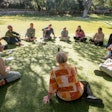#MeToo has become an all-too-daily topic on news channels. It’s inspired celebrities and public figures to unite in adopting a dress code for Hollywood events. And it’s been the impetus for widespread movements around the world. Sexual harassment and assault certainly isn’t a new issue, but the way we’re talking about it is.
The movement swept social media in October 2017, when actress Alyssa Milano fired off a tweet that sparked a major conversation about sexual misconduct. Her call to social media users to use the hashtag if they’d experienced sexual harassment or assault followed the highly publicized allegations against prolific filmmaker Harvey Weinstein.
While Milano’s hashtag campaign reignited the issue, “Me Too” was initially coined by social activist Tarana Burke in 2006.
In the months since the movement gained steam, high-profile individuals across all industries and professions have suffered the consequences. Media icons Matt Lauer, Charlie Rose and Garrison Keillor all lost their jobs. USA Gymnastics national team doctor Larry Nassar will likely spend the rest of his life in jail while a USA Swimming coach is now in hot water. Senator Al Franken is arguably the most well-known of a large number of politicians affected—a group including former Alabama Chief Justice Roy Moore.
“Sexual harassment has been a problem in all industries for many years, but it wasn’t until 2017 that these conversations took center stage,” says Kiki J. Fox, co-founder and president of the Association for Women in Events.
It’s a sobering fact that has forced meeting and event professionals to practice introspection in their own field. After-hours networking, relationship building and functions filled with libations are all part of the drill, which means the extremely fine lines between business and pleasure can become blurred. When we look at numbers, things become a lot clearer.
A recent PCMA poll found 80 percent of respondents said that they had experienced some form of on-the-job sexual harassment. But nearly 75 percent of those event professionals didn’t report the problem. Other industry studies find the same conclusions, with concerns ranging from physical behavior to inappropriate comments.
Barna Group, a California-based research organization that explores faith and culture, put those figures in perspective. In a study Barna Group conducted in October 2017 and administered online to 1,019 American adults, 29 percent of respondents had been victims of sexual misconduct at some point in their lives (not exclusive to work), and 15 percent had witnessed another person being harassed.
Harassment at Events
As recent reports of sexual harassment have surfaced following prominent conferences and meetings, giants of the industry have grappled with how to respond while the rest of us watch. They face the difficult task of rendering justice for the victims who have come forward while also maintaining their reputations as respected leaders.
In October 2017, journalist Quinn Norton took to social media, accusing well-known tech blogger and evangelist Robert Scoble of sexual assault, which she says occurred at Foo Camp—an annual O’Reilly Media hacker conference—a few years back. As a result, Scoble was banned from all future O’Reilly Media events. He has since faced separate allegations from other women.
The National Association of Sports Commissions has also been forced to address allegations of misconduct. Robert Pozo, founder of Continental Event and Sports Management Group, has been prohibited from NASC’s annual symposium after he was accused of taking indecent liberties with fellow attendees last year in Sacramento.
In January, the Presidents Club, an all-male fundraising organization that has been in operation for more than 33 years, announced it would shut down. The decision followed a sexual harassment scandal that unfolded at a function the elite group hosted at The Dorchester in London. A Financial Times reporter who infiltrated the event by working undercover as a hostess witnessed several scenarios in which other hostesses were groped and verbally harassed by guests.
Most recently, hotel mogul Steve Wynn found himself under fire for allegations of harassment, which The Wall Street Journal made public. Though Wynn has vehemently denied the claims, he has resigned as CEO of Wynn Resorts, which he founded in 2002. He also resigned from his position as finance chairman of the Republican National Committee.
All Too Common
But these types of incidents aren’t isolated to large-scale organizations, warns Crystal Washington, a marketing and social media consultant, author and speaker who has been recruited by companies like Google, Microsoft and General Electric for cues on corporate strategy.
“If you have a company, the potential for sexual harassment is there,” says Washington. “Everyone needs to be proactive.”
It’s the responsibility of meeting planners and event professionals to create atmospheres where attendees feel safe and respected. When they don’t, the event loses value, the organizer loses integrity and guests are discouraged from attending future engagements.
To uphold that responsibility, Washington says it’s imperative for every organization to develop and mandate a solid code of conduct for employees. Within that code, the company should articulate a zero-tolerance policy on sexual impropriety and state the consequences it carries. The code should also explain how and to whom employees can report violations. It should be shared repeatedly across all avenues, including digital and social media platforms, in employee handbooks and in companywide communications. Plus, to deter any nefarious behavior from the outside, it should be made public knowledge that the company has this kind of code in place.
Having a policy in place is essential, but executing it fairly and consistently is the most important part. When violations are reported, company leaders should respond respectfully and take swift and decisive action to thoroughly investigate the situation. And they should keep the reporting party updated throughout the process.
Fox points out it takes courage for a victim to come forward. They need to be confident that their complaints will be taken seriously without fear of retaliation.
Apart from policies, which she agrees are nonnegotiables, #RealTalk columnist and marketing strategist Courtney Stanley argues that meeting planners have the power to set a standard regarding sexual misconduct.
“Think about it,” says Stanley. “We create and manage the very environment where sexual harassment often occurs. We have the opportunity and responsibility to prevent, address and change the way people are being treated at meetings and events.”
Stanley has taken her own advice to heart. In October 2017, she exposed the issue in an edition of her #RealTalk column: “That’s What She Said: Sexual Harassment Is Wrong.” She has also advocated awareness through public speaking engagements. At Connect in August 2017, she paired up with Washington to facilitate a session called “Meet Me at Midnight.”
The two, who shared their own experiences as victims of sexual harassment, held an open forum in which they addressed workplace taboos. Topics ranged from sexual harassment to wage negotiation to workplace bullying. Members of the audience were encouraged to join the conversation and share their own stories.
“It was astounding how many people in the room had been victims of or had experienced sexual harassment at an event,” says Washington.















